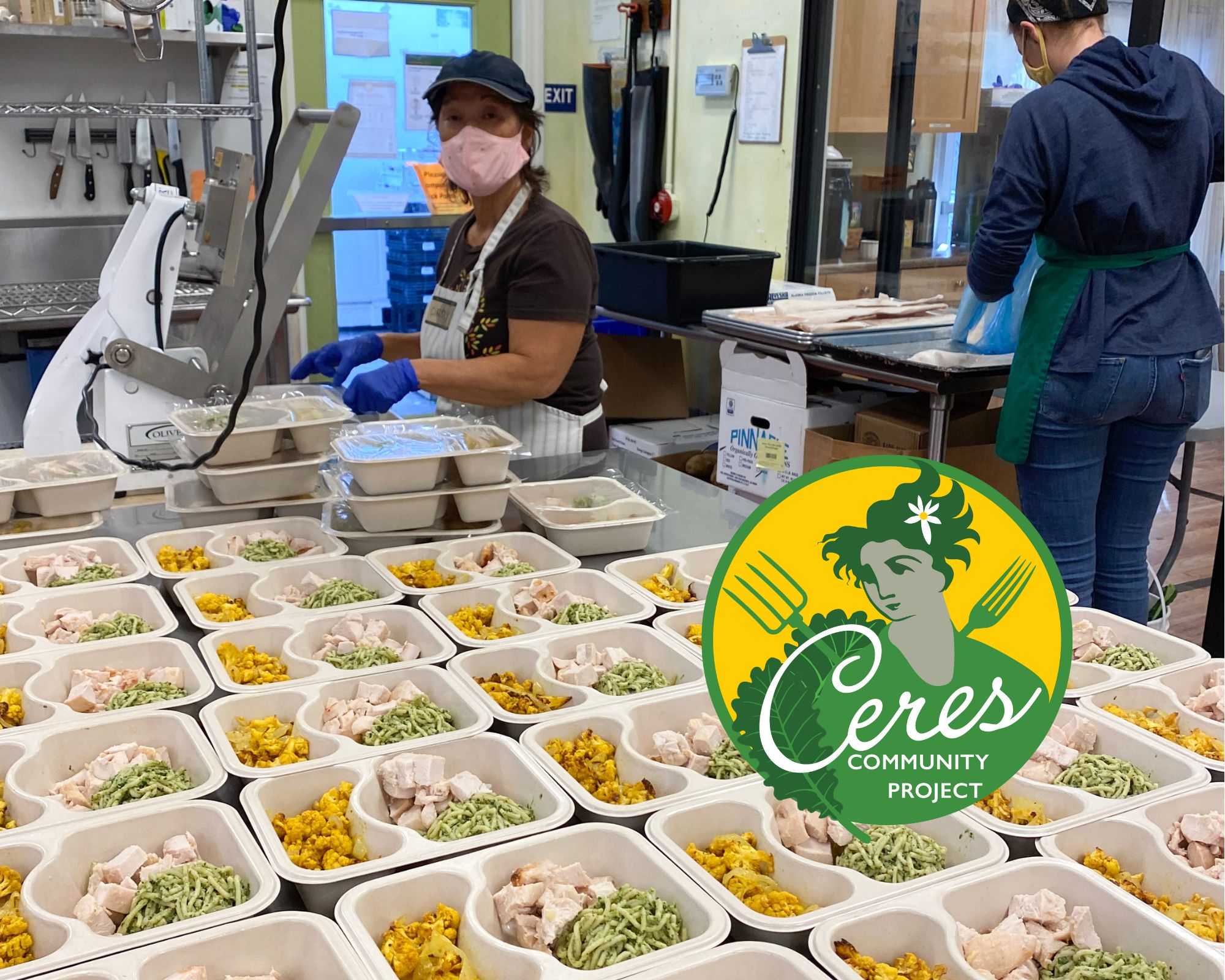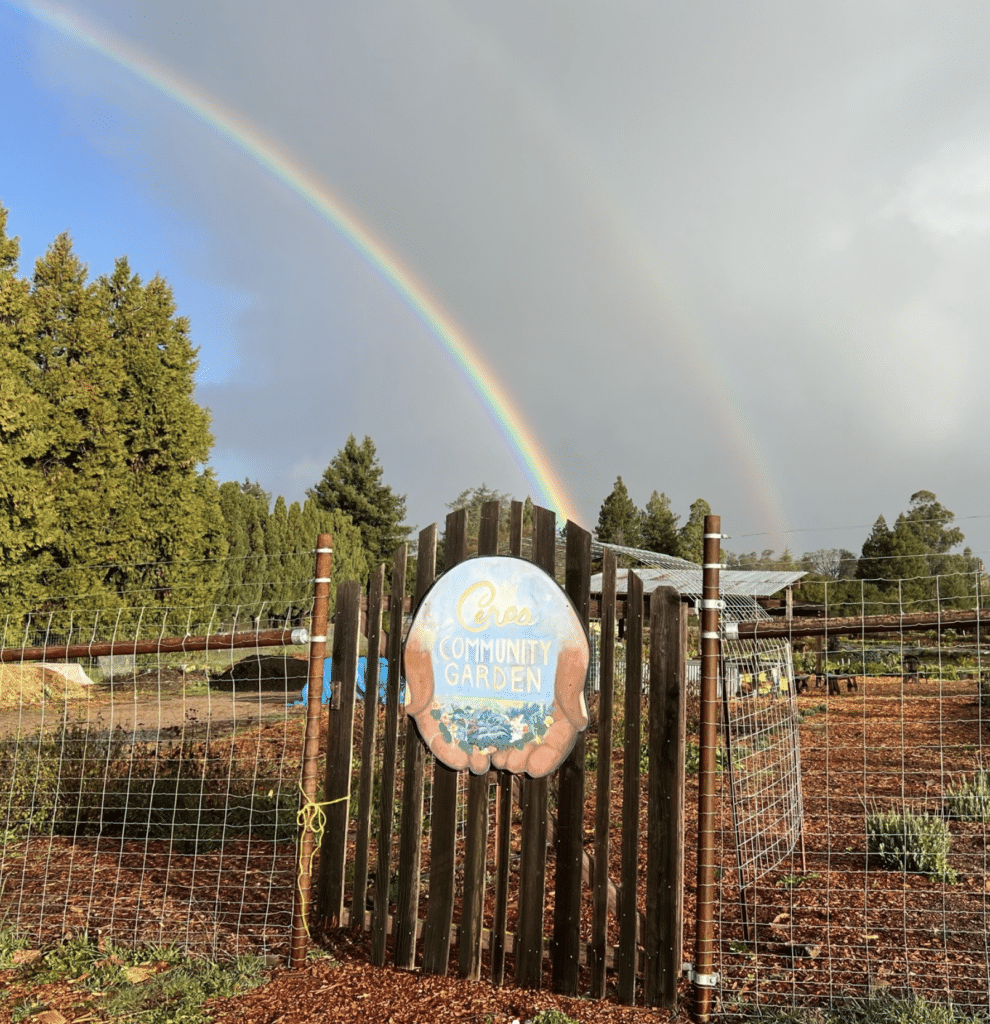We sat down with Elissa from Ceres Community Project to learn more about their home-delivered meal program, their local volunteers and what sets them apart from other organizations with similar missions.
In a few sentences, how would you describe Ceres Community Project?
Since 2007, Ceres Community Project has prepared home-delivered meals to people who are too sick to shop or cook for themselves. Our delicious meals are made from scratch by Teen Chefs with guidance from our professional staff members. As the recognized leader of medically tailored meals (MTMs) in Sonoma and Marin counties, we create meals that feature fresh, high-quality 100% organic ingredients.
What sets meals made by Ceres apart?
Ceres’ meals are unique because they are made using 100% organic, whole food ingredients that are grown in one of our organic production gardens or procured from local and regional sources. Ceres meals are medically tailored, created with guidance from registered dieticians, with nutrient-rich and anti-inflammatory foods, and that meet the standards for nutrition set by the Food is Medicine Coalition.
What makes our meals even more unique is that they provide opportunities for youth volunteers to learn about growing organic produce and using whole food ingredients to prepare healthy meals, all while giving back to their community. Youth experience their own agency to make a difference and gain valuable leadership and life skills.
We serve the entire household, including caregivers, because we know that it’s not just the client who needs support when coping with serious illness. We strive to provide a service that brings families together in their time of need.
There are a few parallels between how our farm partners grow their flower and how Ceres grows its produce for meals. Would you mind describing some of the sustainable growing practices Ceres uses for cultivating food?
Ceres believes that individual, community and planetary health starts with soil, and our two organic production gardens in Sebastopol and Santa Rosa use low-impact farming methods to preserve and build on the healthy microbiome beneath our feet. Garden and kitchen scraps are used to make compost that is put back into our garden beds to raise vegetables, greens, fruit and flowers.
Our new Sebastopol garden, built this past Spring, was designed with carbon sequestering and water retention in mind, using the concepts of permaculture and sustainable agriculture to create a productive and beautiful space that will stand up against the frequent droughts in our region. You can read more about the creation of our Sebastopol garden on our blog!
Ceres puts a focus on policy change, can you tell us a little about these policies and why they’re important?
Ceres supports local, state and federal policies that increase access to healthy, affordable, and culturally relevant foods for all people, and that support a healthy, just, and sustainable food system. While our direct services are vital to support our community, the challenges many of our clients face are the result of systemic problems, and our policy work can support changes that will lead to better health and better lives for millions.
Our goals:
- Integrate medically tailored and medically supportive food into health care as a covered medical benefit.
- Advocate for policies that increase access to healthy food for all people (i.e. increased access to SNAP benefits and universal school meals)
- Advocate for policies that support a just food system (support for farms to transition to organic production, climate friendly agricultural policies, urban farming and farmworker protections)
Why are they important?
Food access improves health equity. All people need access to healthy and affordable food.
Investing in food saves health care costs. It is much cheaper to ensure that people have a healthy diet than it is to pay for hospitalizations.
All food is not created equal. Supporting organic and sustainable food systems supports the full ecosystem of health for people, communities and the planet.
Recent success:
Over the last several years we’ve partnered with the California Food is Medicine Coalition to build on the research base and support policy change for medically tailored meals to be considered an essential health benefit covered by public insurance. We are proud to say, California’s Medicare health plans can now offer medically tailored meals as a covered benefit for their members.
When someone donates to Ceres what does that donation go towards? Can you provide a specific example of what a $10 or $20 donation provides?
Every little bit counts! A $10 donation helps cover the cost of one of our nutritious and delicious medically tailored meals. That $10 extends beyond the cost of a meal by providing an opportunity for clients and their families to learn that healthy food tastes good and makes them feel better, and for youth to discover their agency as they learn about the importance of organic food for their health and the health of the planet.
Who’s eligible to receive meals from Ceres and how can they find them?
Ceres serves clients of all walks of life and all parts of our diverse community. Our Healing Meals program focuses on individuals and families experiencing chronic or acute illness, and we try to emphasize those with low or very low incomes who are most at risk of the complications of malnutrition who have the fewest options. The majority of our clients are seniors living alone with low or fixed incomes who are managing a serious illness, and sometimes food insecurity.
Clients are referred to Ceres in several ways: from local healthcare organizations, previous clients, friends and family members, volunteers, etc.
You can go to our website: ceresproject.org and click on “Get Meals” or call (707) 829-5833 to speak with someone on our Client Care team.
How can someone volunteer for Ceres? And what is the volunteer experience like?
You can sign up to volunteer with Ceres on our website at ceresproject.org and clicking on “Volunteer” – we have opportunities for volunteers in both Marin and Sonoma.
Adults can volunteer in our kitchens, gardens, as Delivery Angels, or provide administrative support at our headquarters in Sebastopol.
Volunteering in our kitchen includes preparing ingredients for youth volunteers to use in our medically tailored meal recipes, bagging meals so they’re ready for our Delivery Angels to pick up and deliver straight to our clients’ doors, and various other kitchen tasks.
Adult garden volunteers help maintain our organic production gardens – our Santa Rosa garden is located at the SAY Dream Center, and our large (1.5 acres) Sebastopol garden is located at the Sebastopol Charter School. Volunteers help with weeding, planting, harvesting and keeping our garden spaces clean.
Delivery Angels receive local routes to deliver meals directly to our clients’ doors, giving them an opportunity to engage with their community and connect with our more isolated clients.
We engage youth (ages 14-22) as the primary chefs and gardeners in our kitchens and gardens. If you know a young person who may enjoy learning how to grow and cook healthy food, send them our way!


